- Home
- Margaret Pemberton
A Multitude of Sins Page 3
A Multitude of Sins Read online
Page 3
‘Of course, sir.’ Mr Kingsley was a valued client. If his daughter wished to have the balance of the room disturbed by having one set of curtains drawn back, then one set of curtains would be drawn back. Besides, hadn’t her mother just died? He noted the black velvet dress, the brave set of her mouth, and saw to it that her chair was moved a few inches further to the left so that her night-time view of the river was unimpaired.
‘Lobster, terrine of duckling, and a bottle of Montrachet 1914,’ Jerome said, seeing no reason why mourning should spoil his appreciation of a fine wine.
‘And for Madame?’ the waiter enquired discreetly.
Jerome looked vaguely surprised. It was the first time they had dined out together alone, and it had not occurred to him that she might need help with the menu.
‘I’ll have lobster, too,’ Elizabeth said, determined not to let her father down by choosing something childish. ‘And the duckling, but not the Montrachet.’
The waiter suppressed a smile. ‘Lemonade, perhaps?’ he enquired helpfully.
Elizabeth hesitated and then shook her head. Lemonade did not sound very sophisticated. ‘No, thank you,’ she said with grave dignity. ‘Could I have a pineapple juice, please?’
The waiter nodded, enchanted by the silk-gold fall of her hair, the medieval severity of her black velvet frock, and her natural gracefulness.
The restaurant was not very full, the bad weather having kept all but the Savoy’s residents firmly indoors. With relief, Jerome saw that there was no one he knew at the nearby tables. He was tired of listening to well-meaning friends sympathizing with him on his loss. Their words brought him no comfort at all. They were platitudes, politely uttered but revealing that the speakers had no idea of the depth of his grief. Only Elizabeth had any understanding, and only with Elizabeth did he gain any comfort.
Looking across the table at her, he pondered on what Adam had said to him. Did her music really mean so much to her? She was talented, certainly. Everyone told him that. But, then, it was to be expected. She was, after all, his daughter. He regarded her with pride. There were music schools in Paris. No doubt better schools than they were in London. He would fix something up for her. Something a little more convenient than the rigid demands of the Academy. The lobster arrived, and as he began to eat he began to feel the first stirrings of well-being. From now on she would be his companion, as Serena had been whenever they had been together. His brows pulled together slightly. Serena had loathed travelling and had seen no necessity for it. Though Jerome always pleaded business commitments, both he and she knew that it was not strictly true. If he had wished to remain in London, he could have done so quite easily. As it was, he was a restless man, happier in hotels than in a permanent home; and Serena, loving him, had colluded quite happily in the fabrication that his many absences were necessary for their financial well-being.
‘You have never been to Paris, Elizabeth, have you?’ he asked as the remains of the lobster were removed and the duckling was placed before them.
‘No. Mummy said she would take me as a treat when my French improved.’
Jerome stared at her curiously. He hadn’t known she had been studying French. Nor that Serena had intended a trip to France with her. He wondered how many other things concerning his family’s day-to-day life he had been ignorant of.
‘Well,’ he said, slightly disconcerted, ‘it’s a beautiful city, even in winter. I’ve booked tickets for tomorrow’s boat-train. We should be there in time for lunch.’
Her eyes widened, and her mouth rounded on an ‘oh’of pleasure. He felt himself relax. Adam was a well-meaning idiot to have thought Elizabeth would be dismayed at the prospect. ‘It’s a good place to buy clothes, too,’ he added, thinking how adult she looked in the black velvet, and what a pleasant change it was from her school uniform.
‘That will be lovely, Daddy,’ she said enthusiastically. ‘Can we go to the Salle Pleyel and the Théátre des Champs Elysées?’
‘I don’t see why not,’ he said, pleased with her response. Previously it had always been Serena who had taken her to concerts. From now on he would have to undertake the task. He had no ear for music himself and found it neither pleasurable nor relaxing. However, if Elizabeth wished to attend one or two concerts, he would endure them with good grace.
‘We can drive down to Nice if it gets too chilly,’ he continued affably. ‘March and April are beautiful months on the Riviera.’
‘I don’t understand.’ She looked bewildered. ‘I thought you said we were leaving right away. Tomorrow.’
He nodded, helping himself to another glass of Montrachet ‘We are.’
Slowly she laid down her knife and fork. ‘For a holiday? And then later, in the spring, we’re going again?’
Her voice had lost its eagerness and was small and unsure. Jerome was unaware of her apprehension. The wine was excellent, and he was anticipating the brandy that would follow.
‘No,’ he said easily, signalling for the waiter. ‘We’ll make our base the George V in Paris. At the end of the month I have a meeting to attend in Geneva. It’s only a three-hour train ride. You can boat on the lake while I attend to my meeting, and then we could stay on in Switzerland and do some skiing if you wish. Later, at the end of March, or the beginning of April, we’ll move down to the Negresco in Nice. It’s just as easy a base to work from, with all the advantages of milder weather and the prospect of some cruising.’
Her face was ashen beneath the bright lights of the chandeliers. ‘But, Daddy, I can’t take such a long holiday. There’s school.…’
‘That’s no problem,’ Jerome said confidently. ‘I’ll write to the principal tonight. Explain the circumstances.…’
Her knuckles were clenched white on the starched linen table-cloth. ‘You can’t do that, Daddy,’ she said, her voice tight and shaking. ‘I’ve been asked to play at the Central Hall with the London Symphony Orchestra. I’m going to have to rehearse very hard and.…’
He leaned across the table, taking hold of her hands and imprisoning them in his own. ‘I’m sorry,’ he said, and his voice was sincere, his eyes pleading. ‘I know that it’s a disappointment to you, Elizabeth, but it can’t be helped. There’ll be other concerts for you later. Lots of them. At the moment what’s important is that you and I are together.’
‘Can’t we be together in London?’ Her hands grasped his tightly. ‘Please, Daddy. You can stay in London, and I’ll look after you and—…’
‘No.’ Gently he released her hands, turning to the waiter and requesting two lemon sorbets and a bottle of Chateau Yquem, 1921.
Her mouth was dry, her heart slamming against her chest. She wanted to be with him more than anything else in the world. The thought of Eaton Square with only Mrs Mac for company was horrific. Yet they couldn’t leave London. They couldn’t live in France. There was her music. Miss Rumbatin. The concert.
‘You don’t understand, Daddy,’ she said, trying to keep her voice steady, trying not to let her panic show. ‘If I leave the Academy now, they won’t take me back. I have to stay on there and I have to work.…’
‘I’ll arrange piano lessons for you in Paris,’ Jerome said, a trace of irritation creeping into his voice.
‘I need to go to the Academy,’ she said again, her voice desperate. ‘Please, Daddy! It’s the best school of music in Europe, and.…’
The Cháteau Yquem was very good, and he wondered why he had not had the foresight to lay some bottles of it down. Her eyes were pleading with him across the table. A smile touched his lips at her naïvety. ‘There are other schools,’ he said reassuringly. ‘Other teachers. Don’t worry about your music, Elizabeth. Just think how marvellous it will be for us to be together.’
He didn’t understand. He was her father and he was absolutely wonderful, but he didn’t understand about music. He never had. Her throat tightened. He needed her. He wanted her with him. And it would break his heart if she refused and remained in Eaton Square with Mrs Mac. She
shuddered. That was as bad as the prospect of being torn away from the Academy and continuing her studies elsewhere. Her father was talking of being in Geneva at the end of the month. Of being in Nice for March and April. What school could possibly tolerate such absences? As she looked across the table at him, loving him with all her heart, she knew that any future lessons would not only be inferior in quality but would also be terrifyingly sporadic. And she also knew that she had no choice. No choice at all.
‘Paris will be lovely,’ she lied bravely, and he did not see the glitter of unshed tears in her eyes or hear the anguish in her voice. He was smiling to himself, thinking how wrong Adam had been, anticipating with relish the fine French brandy that was to follow the Chateau Yquem.
Chapter Two
‘And will Madame require a buffet breakfast for the guests?’ the rose-buttonholed deputy manager of the famed Negresco Hotel asked deferentially. ‘Kedgeree and scrambled eggs perhaps? Smoked salmon and champagne?’
Madame hesitated, shining soft shoulder-length blonde hair held back from her face with a ribbon, her cotton dress demurely collared in white pique, her feet shod in ankle-socks and buckled sandals. Her father relished his parties, but by five in the morning he was usually happy to sink into a chair with a large brandy and conduct a witty and often malicious post-mortem on the proceedings with Adam Harland. An organized breakfast for the hundred guests he had invited to his forty-fifth birthday party would mean no such early-morning reprieve.
‘It is customary…,’ the deputy manager murmured.
‘No, thank you,’ Elizabeth said with the quiet confidence of one accustomed to making decisions and unawed by the deputy manager’s status. ‘I would like the last drinks to be served at three a.m. and the musicians to leave half an hour later.’
The deputy manager nodded. He was not in the habit of discussing arrangements with little girls still in the schoolroom, but this one was pretty and charming and certainly knew what she was about.
‘And the flowers, madame?’
‘Orchids and franciscea and bird-of-paradise,’ she said unhesitatingly. They were not her favourites, being too sub-tropical and lush, but they were her father’s favourites, and as always she ordered what he would like and what would bring him pleasure.
The deputy manager nodded. The Kingsleys had a permanent suite at the Negresco, and if Elizabeth had asked for African lilies they would have been flown in without demur.
‘Perhaps if you just cast your eye over the menu again, madame?’ he said, proffering the menu that she had agreed earlier with the chef.
Elizabeth did as she was asked and handed it back to him, satisfied. Everything was in order. It was going to be a lovely party. Adam was motoring down from London. Friends of her father’s were coming from Paris and Geneva and even Rome. There was a gorgeous white chiffon gown hanging in her wardrobe, specially designed for her by Schiaparelli. And in three days’time she would have her father entirely to herself. They were going to Venice where he had promised her she could indulge in concerts for a whole week. She sighed rapturously. There would be the choir in St Mark’s Cathedral, starlight concerts in the courtyard of the Doge’s Palace, opera at the Fenice.…
‘Will there be anything else, madame?’ the deputy manager asked, aware that he no longer had her attention. A slight flush touched her cheeks at being caught so flagrantly daydreaming.
‘No, thank you,’ she said in her charmingly accented French. ‘I am sure everything will be perfect.’
‘Enchanté, madame.’ There was a gleam in his dark brown eyes as he inclined his head and took his leave of her. She was like a beautiful flower in perfect bud, just about to blossom. And when she did.… ‘Une belle femme,’ he said beneath his breath as he closed the door of her suite behind him. ‘Une trés belle femme!’
Elizabeth poured herself a glass of iced fruit juice from the carafe standing on a glass-topped table and carried it out of the opulently furnished sitting-room and on to the balcony that looked out over the Promenade des Anglais and the shimmering blue of the Mediterranean. Despite her father’s promises to the contrary, there had not been many concerts in the three years since he had taken her away from Eaton Place. Nor had there been many music lessons. Certainly there had been nothing to compare with the tuition she had been receiving at the Royal Academy of Music in London.
Despite her pleasure at the prospect of the forthcoming party, her heart hurt and she suppressed a sigh. She now knew that it would never be any different. Her father loved her, spent money lavishly on her, adored her company, yet he was insensitive to any but his own needs. Music was unimportant to him, and so he could not conceive of the importance it played in her own life. She loved him too much to reproach him for his failings. Whenever she could, she sought out lessons in whatever city they happened to be in. It was better than nothing, but she knew that such haphazard coaching would never develop her talent to the full.
The local piano teacher in Nice had been amazed when he had first heard her play. ‘And you want to take lessons from me, mademoiselle?’ he had asked her bewilderedly. ‘You are not in full-time attendance at a college of music? An academy?’
A shadow had darkened her eyes, and then she had smiled and he had wondered if he had imagined it. ‘No,’ she had said, and for the first time he realized that she was not French but English.
‘Then, I will be delighted to accept you as a pupil. Shall we start now? With a Hanon exercise?’
As her lessons increased in number, he had become more and more puzzled. She had extraordinary talent and a self-discipline rare in a girl so young. Money was not a problem for her. It had taken him less than a week to discover that her father was a wealthy financier and that she was resident at the Negresco. Why, then, was she not enrolled at one of the major music schools in Paris? It made no sense to him, and neither did her frequently cancelled lessons. He could have sworn that they were the most important thing in her life, yet she often cancelled them, her voice strained and apologetic. With any other pupil he would have lost patience, telling them that they must find tuition elsewhere. With Elizabeth he made an exception. She was different from any other pupil he had ever had, striving for perfection with dedicated single-mindedness. There were often times when he suspected that he learned far more from her than she did from him.
‘Tell me how you memorize,’ he had asked her at her third lesson. ‘Explain your method to me, please.’
She had frowned a little, finding it difficult to analyse and to put into words. Her hair was pulled away from her face, secured with a ribbon at the nape of her neck as it always was when she played. She tucked a stray strand behind her ear, saying: ‘First of all, I sight-read and then I look at the structure of the work, and work on the fingering and write it in.’
He was sitting opposite her and he leaned towards her, his hands clasped loosely between his knees. ‘And do you always write it in?’ he asked, intrigued.
She nodded.
‘And then what do you do?’
She gave a slight shrug of her shoulders, as though it should be obvious. ‘Then I memorize the piece from a visual point of view, and then the harmonies,’ Her voice grew more confident. ‘In a sonata, for instance, first you have the exposition, then the development, then the recapitulation, and so you have a union, a connection you can build on.’
‘And how old are you?’ he had asked, wondering if, when she had told him previously, he had misheard.
Her mouth had curved into a dimpled smile. ‘Thirteen.’
He had shaken his head in disbelief and had asked her to return her attention to a Czerny étude.
She looked out across the promenade, suppressing a small sigh. Her lessons had continued but they were formal and routine, possessing none of the inspirational quality that had been so much a part of her lessons at the Royal Academy.
A white Lamborghini slid to a halt beneath the porte-cochére far below her. A smile touched her lips as she saw a stunningly dre
ssed, olive-skinned woman step out of the car, a large circular hat on her head, two chihuahuas skittering around her ankles. Princess Luisa Isabel Calmella, her father’s latest woman friend. The thirty-year-old princess was a fervent patron of the arts, and it was to her urgings that Elizabeth owed the coming trip to Venice.
She glanced at the slim gold watch on her wrist. It was nearly one o’clock. The princess was obviously visiting the Negresco for lunch. She put down her glass and hurried back into the sitting-room, grabbing a blazer and a school-bag. It was also time for afternoon classes at the lycée she attended a half-dozen streets away.
The lift came directly, and a pageboy, little older than herself, greeted her with a polite inclination of his head. Seconds later she hurried through a reception hall of Versailles splendour, acknowledging the doorman’s salute as she stepped out on to the sun-drenched promenade. Within minutes she was in the maze of narrow streets at the back of the hotel, no longer ‘Madame’, arranging a de-luxe birthday party for a hundred guests with poise and flair, but a schoolgirl sadly lacking a knowledge of French history.
The lycée was not the kind of school to which Jerome Kingsley would normally have sent his daughter. It was a little local school neither academically famed nor exclusive. However, other more suitable schools had refused to accept a child whose father insisted that she only attend lessons when it was not inconvenient to him that she do so. The lycée, too, was not over-pleased by Jerome’s laissez-faire attitude towards his daughter’s education.
‘C’est une crime!’ her despairing French-history teacher had exclaimed when Jerome had breezily announced that Elizabeth would not be able to do the extra work set for her in order that she reach a satisfactory standard in the subject. That, instead, he had need of her to organize his dinner-parties, accompany him to cocktail-parties, be his companion at late-night suppers on the yachts of visiting friends.

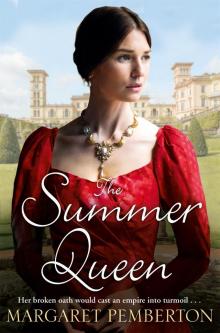 The Summer Queen
The Summer Queen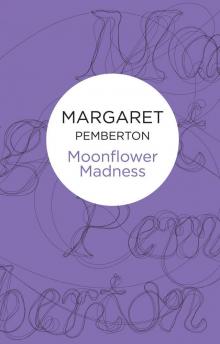 Moonflower Madness
Moonflower Madness The Londoners
The Londoners The Flower Garden
The Flower Garden Yorkshire Rose
Yorkshire Rose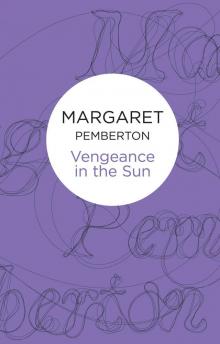 Vengeance in the Sun
Vengeance in the Sun Zadruga
Zadruga Beneath the Cypress Tree
Beneath the Cypress Tree Magnolia Square
Magnolia Square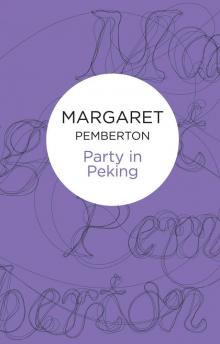 Party in Peking
Party in Peking Lion of Languedoc
Lion of Languedoc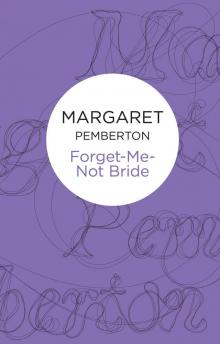 Forget-Me-Not Bride
Forget-Me-Not Bride The Guilty Secret
The Guilty Secret Rendezvous With Danger
Rendezvous With Danger A Season of Secrets
A Season of Secrets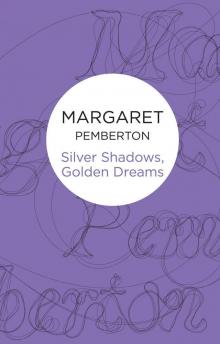 Silver Shadows, Golden Dreams
Silver Shadows, Golden Dreams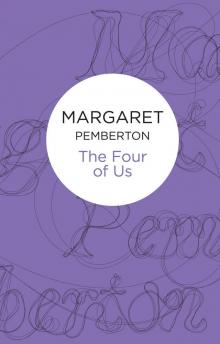 The Four of Us
The Four of Us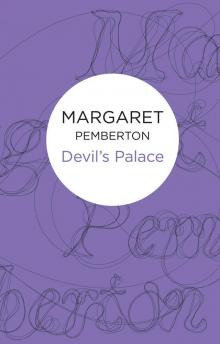 Devil's Palace
Devil's Palace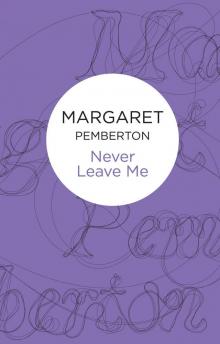 Never Leave Me
Never Leave Me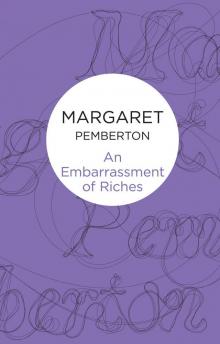 An Embarrassment of Riches
An Embarrassment of Riches African Enchantment
African Enchantment White Christmas in Saigon
White Christmas in Saigon Coronation Summer
Coronation Summer A Multitude of Sins
A Multitude of Sins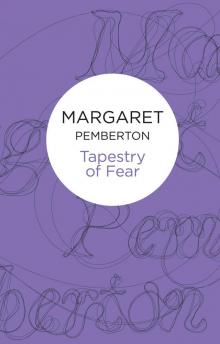 Tapestry of Fear
Tapestry of Fear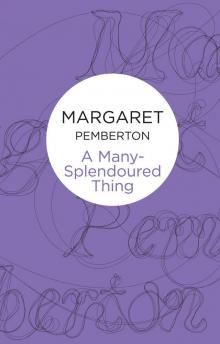 A Many-Splendoured Thing
A Many-Splendoured Thing